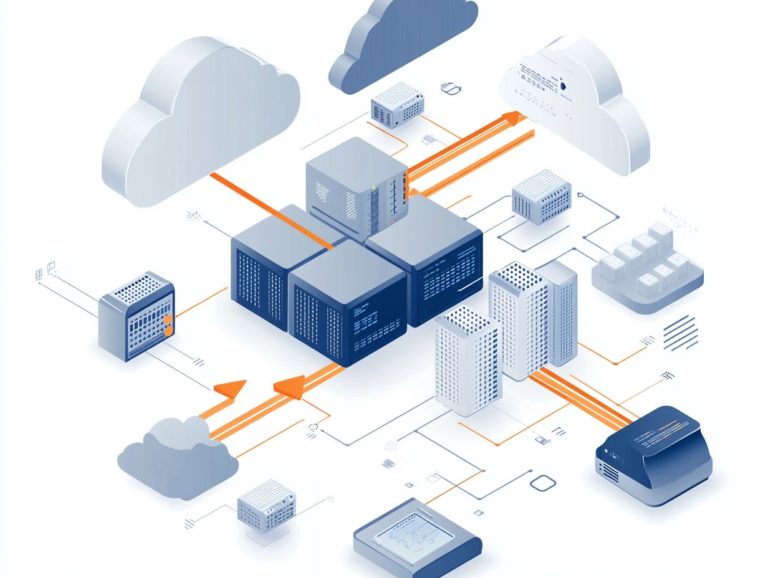5 Popular IaaS Tools for Businesses
In today s digital landscape, Infrastructure as a Service (IaaS) has truly revolutionized the way businesses like yours can achieve flexibility and scalability.
With industry giants such as Amazon Web Services, Microsoft Azure, and Google Cloud Platform at the forefront, it s easy to feel a bit overwhelmed by the array of choices available.
This article delves into five of the most popular IaaS tools, showcasing their key features and benefits so you can make informed decisions.
You ll discover how to select the right IaaS solution tailored to your needs, address common implementation challenges, and explore effective strategies to navigate around them.
Join in as you embark on a journey through the world of IaaS, empowering your business’s cloud transformation.
Contents
- Key Takeaways:
- 1. Amazon Web Services (AWS)
- 2. Microsoft Azure
- 3. Google Cloud Platform
- 4. IBM Cloud
- 5. Oracle Cloud Infrastructure
- What Is IaaS and How Does It Benefit Businesses?
- Frequently Asked Questions
- What does IaaS stand for and why is it important for businesses?
- What are the top 5 popular IaaS tools for businesses?
- How does AWS compare to the other popular IaaS tools for businesses?
- What benefits do IaaS tools provide for businesses?
- Can businesses customize their IaaS tools to fit their specific needs?
- Do businesses need to have technical expertise to use IaaS tools?
Key Takeaways:

- Amazon Web Services (AWS), Microsoft Azure, Google Cloud Platform, IBM Cloud, and Oracle Cloud Infrastructure are the top 5 IaaS tools for businesses.
- IaaS (Infrastructure as a Service) tools provide scalability, cost-effectiveness, and flexibility for businesses.
- There are various types of IaaS tools available, including public, private, and hybrid. Businesses should carefully consider their needs before choosing one.
- Implementing IaaS may present challenges such as data security and integration, but businesses can overcome them through proper planning and management.
1. Amazon Web Services (AWS)
Amazon Web Services (AWS) stands as a premier cloud service provider, celebrated for its wide range of cloud services that enable you to drive digital transformation.
AWS helps optimize operational efficiency and realize significant cost savings.
Among these offerings, AWS EC2 truly shines. It delivers virtual machines that allow mid-sized enterprises like yours to scale resources up or down in response to demand.
This essential capability boosts business agility.
When you compare AWS to other cloud providers, its scalability options are unmatched. You can adapt seamlessly to market fluctuations.
In addition, AWS’s robust disaster recovery features ensure that your operations can be swiftly restored in the unlikely event of a failure, minimizing downtime and keeping your business on track.
This combination of flexibility and reliability makes AWS an attractive solution for organizations seeking to bolster their resilience while effectively managing IT costs.
Discover how AWS can transform your business today!
2. Microsoft Azure
Microsoft Azure emerges as a leading cloud service provider, delivering a powerful IaaS platform designed to meet the varied demands of your business.
It empowers you with seamless cloud management and scalable enterprise solutions.
With a comprehensive suite of features, Azure Virtual Machines enable you to effortlessly deploy and manage virtualized environments.
This ensures your workloads can scale whenever needed.
The integration with other Microsoft tools, such as Office 365 and Dynamics 365, creates a cohesive experience that boosts productivity and fosters collaboration among your teams.
Azure s enterprise-grade solutions allow you to leverage advanced analytics and AI capabilities, driving your digital transformation while prioritizing security and compliance.
This platform evolves with your company, offering the flexibility and reliability essential for supporting your growth and innovation strategies.
Don’t miss out on the benefits of Azure services!
3. Google Cloud Platform
Google Cloud Platform (GCP) is your go-to suite for cloud services, offering a robust Infrastructure as a Service (IaaS) that prioritizes performance optimization.
It minimizes operational costs as you navigate the cloud ecosystem.
With tools like Google Compute Engine at your disposal, you ll enjoy unparalleled flexibility in deploying applications.
Whether you’re managing simple websites or intricate enterprise-level software, GCP gives you dynamic resource allocation.
This allows your organization to scale computing resources up or down as necessary, significantly optimizing costs.
This level of adaptability makes GCP a strong contender in the cloud arena when compared to other providers.
Plus, the pay-as-you-go pricing model enhances its attractiveness, ensuring you only pay for what you actually use. This ultimately leads to more efficient budget management and impressive cost savings for your business.
Explore how GCP can elevate your cloud strategy!
4. IBM Cloud

IBM Cloud stands as a versatile cloud service, offering a comprehensive Infrastructure as a Service (IaaS) platform that integrates advanced security measures and automation tools. This ensures not only business continuity but also robust support for enterprise-grade solutions in an increasingly competitive landscape.
With its strong infrastructure, you can scale your operations effortlessly while enjoying enhanced security features designed to protect sensitive data against emerging threats.
You have the opportunity to leverage IBM Cloud’s disaster recovery solutions, carefully designed to reduce downtime and speed up recovery during unforeseen disruptions.
For example, by utilizing the platform s automated backups and failover capabilities, you can achieve remarkable operational efficiency and maintain uninterrupted service delivery, even in challenging circumstances.
With its unbeatable combination of security and scalability, IBM Cloud is the ultimate choice for forward-thinking businesses. Discover how IBM Cloud can transform your business today!
5. Oracle Cloud Infrastructure
Oracle Cloud Infrastructure (OCI) presents robust IaaS solutions specifically designed for mid-sized enterprises. It offers effective resource provisioning and cloud-native solutions that enhance both efficiency and scalability.
What truly distinguishes OCI in the competitive cloud landscape is its advanced toolkit, which seamlessly integrates compute, storage, and networking capabilities. This integration gives you the power to scale your operations and innovate at an impressive pace.
By harnessing unique features like bare metal servers and high-performance block storage, you can manage your cloud infrastructure more effectively, responding to market demands with remarkable agility.
OCI’s automation tools and intuitive dashboards enable you to streamline operations, allowing your team to concentrate on strategic initiatives instead of getting bogged down by routine maintenance tasks.
What Is IaaS and How Does It Benefit Businesses?
Infrastructure as a Service (IaaS) is a game-changer in cloud services, granting you access to scalable cloud infrastructure that boosts your business agility while optimizing operational costs and enhancing resource utilization.
This model offers essential components like customizable virtual machines tailored to your specific workload needs, robust storage solutions for securing and managing vast data sets, and flexible network resources that guarantee seamless connectivity and communication.
By harnessing IaaS, you can streamline your digital transformation efforts, gaining the agility required for rapid innovation. It enhances your data storage and management capabilities, allowing you to handle data more efficiently without the burden of maintaining physical hardware.
This leads to improved efficiency and cost-effectiveness in your operations.
What Are the Key Features of IaaS Tools?
IaaS tools offer key features like automation capabilities and powerful management tools to streamline your operations, enhance performance, and elevate overall efficiency, especially when considering the top 5 cloud providers for startups.
These functionalities are essential for organizations that aim to reduce manual interventions and minimize the risk of human error.
For example, tools such as Terraform empower your teams to provision and manage infrastructure using simple, reusable code, facilitating rapid deployment and scaling of resources.
On the other hand, Ansible excels in configuration management, automating routine tasks like application deployment and updates.
Together, these tools ensure that your operational workflows are efficient and consistent across various environments, ultimately leading to better resource utilization and cost-effectiveness.
What Are the Different Types of IaaS Tools Available?

The market presents you with a rich selection of IaaS tools from various cloud service providers. This includes virtualization tools, open-source solutions, and container orchestration platforms like Kubernetes, which is a tool for managing containerized applications. Before making a decision, consider these 5 things to know before choosing IaaS, as all these tools are designed to cater to your specific business needs.
Among these offerings, virtualization tools empower you to manage resources efficiently. They allow you to scale applications without the constraints of hardware limitations. Container orchestration platforms, on the other hand, facilitate the seamless deployment and management of microservices, which are increasingly essential in modern development practices.
When choosing between open-source tools and proprietary solutions, your decision often rests on key factors like cost and flexibility. Open-source tools typically offer greater customization and come with no licensing fees. This presents significant advantages for organizations that prioritize innovation and security.
Paid tools often offer better support and built-in features, making them appealing to those who seek a streamlined, hassle-free experience.
How Can Businesses Determine the Right IaaS Tool for Their Needs?
Selecting the right IaaS tool is essential for your business. It requires a thorough evaluation of your unique needs, preferred cloud providers, and popular open source cloud solutions available for effective workload management and resource provisioning.
As you weigh your options, consider scalability to accommodate future growth. You ll want a solution that can expand resources effortlessly without causing significant downtime.
Understanding the various pricing models is equally important. Some providers offer pay-as-you-go plans, while others provide reserved capacity options. Both can significantly influence your budgeting strategies.
Your specific business requirements ranging from compliance standards and data security measures to geographical preferences should also play a pivotal role in your decision-making process.
Top cloud providers like AWS, Google Cloud, and Microsoft Azure each have their strengths and weaknesses. It s crucial to compare their features, performance metrics, and customer support to find the perfect fit for your needs.
What Are the Common Challenges of Implementing IaaS?
Implementing IaaS can pose a range of challenges for your business. These include security measures, data residency concerns, high operational costs, and the intricacies of effective cloud management.
These obstacles can significantly hinder your organization s ability to fully capitalize on the benefits of Infrastructure as a Service. If you don t pay adequate attention to security protocols, you risk exposing sensitive data to cyber threats. This could lead to financial losses and harm to your reputation.
Navigating data residency regulations can also be daunting. This can potentially result in compliance issues that further complicate matters. The rise in operational costs, often stemming from neglected resource management strategies, can add layers of complexity to your migration journey.
Tackling these challenges head-on ensures a smooth transition and secures long-term operational success.
How Can Businesses Overcome These Challenges?
Overcoming the hurdles of implementing IaaS can be exciting! You can harness the power of automation tools, robust cloud management solutions, and strategic planning. This approach not only ensures business continuity but also helps you maintain a competitive edge.
By effectively integrating these tools, you can streamline your operations, minimize human error, and optimize resource allocation. Embracing a culture of continuous improvement is crucial, as deploying IaaS is not merely a one-off task but a dynamic journey.
Encouraging ongoing training and providing solid support for your team will keep them well-informed about the latest technologies and best practices. This proactive strategy gives your staff the power to troubleshoot issues more efficiently and enhances overall organizational resilience. Ultimately, it paves the way for a more successful IaaS deployment.
Frequently Asked Questions

What does IaaS stand for and why is it important for businesses?
IaaS (Infrastructure as a Service) is vital for businesses. This service offers access to virtual resources like servers and storage, allowing businesses to adjust based on their needs without the costs of physical infrastructure.
What are the top 5 popular IaaS tools for businesses?
The top five IaaS tools for businesses are:
- Amazon Web Services (AWS)
- Microsoft Azure
- Google Cloud Platform
- IBM Cloud
- Oracle Cloud Infrastructure
These tools provide a wide range of features and services tailored to meet diverse business needs.
How does AWS compare to the other popular IaaS tools for businesses?
AWS leads the IaaS market, offering a comprehensive set of services and a robust global infrastructure. It boasts a strong record of reliability, security, and customer support. However, exploring the top 5 migration tools for cloud solutions reveals that each of the other tools has its own strengths and unique offerings. Businesses should evaluate their specific needs before choosing a provider.
What benefits do IaaS tools provide for businesses?
IaaS tools deliver numerous benefits:
- Cost savings
- Scalability
- Flexibility
- Improved efficiency
By using virtual resources, businesses can reduce hardware and maintenance costs and easily scale as needed.
Can businesses customize their IaaS tools to fit their specific needs?
Yes, most IaaS tools offer high customization and flexibility. Businesses can select the services and features they require and pay only for what they use. They can also adjust resources in real-time to meet changing demands, making this a cost-effective option for businesses of all sizes. For those looking to enhance their cloud strategies, exploring the top 5 multi-cloud strategies for businesses can provide valuable insights.
Do businesses need to have technical expertise to use IaaS tools?
While having technical knowledge can be beneficial, most IaaS tools are designed to be user-friendly. They often provide intuitive interfaces and support services, making it easier for businesses to manage their infrastructure effectively. To enhance project workflows, consider exploring 5 popular SaaS tools for project management.






